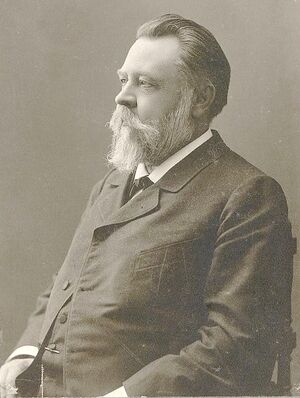Ilya Slatin: Difference between revisions
No edit summary |
|||
| (3 intermediate revisions by 2 users not shown) | |||
| Line 1: | Line 1: | ||
{{picture|file=Ilya_Slatin.jpg|caption='''Ilya Slatin''' (1845–1931)}} | |||
Russian conductor, pianist and teacher (b. 7/19 July 1845 in Belgorod, near Kursk; d. 13 April 1931 in [[Kharkov]]), born '''''Ilya Ilyich Slatin''''' (Илья Ильич Слатин). | Russian conductor, pianist and teacher (b. 7/19 July 1845 in Belgorod, near Kursk; d. 13 April 1931 in [[Kharkov]]), born '''''Ilya Ilyich Slatin''''' (Илья Ильич Слатин). | ||
Slatin enrolled at the [[Saint Petersburg]] Conservatory in 1863, where over the next six years he studied music theory with [[Nikolay Zaremba]], and piano with Aleksandr Dreyshtok (1818–1869). In 1869 he moved to [[Berlin]], where he received further lessons in piano from Theodor | Slatin enrolled at the [[Saint Petersburg]] Conservatory in 1863, where over the next six years he studied music theory with [[Nikolay Zaremba]], and piano with Aleksandr Dreyshtok (1818–1869). In 1869 he moved to [[Berlin]], where he received further lessons in piano from Theodor Kullak (1818–1882) and in composition from Richard Wüerst. He made his debut as conductor in [[Dresden]] two years later with symphonic concerts of Russian music. | ||
In 1871 he returned to Russia, and with the assistance from [[Anton Rubinstein]] he founded the [[Kharkov]] branch of the Russian Musical Society (RMS), of which he was the first director. Slatin also founded the [[Kharkov]] Music school in 1883, which developed from the music classes started by the RMS. | In 1871 he returned to Russia, and with the assistance from [[Anton Rubinstein]] he founded the [[Kharkov]] branch of the Russian Musical Society (RMS), of which he was the first director. Slatin also founded the [[Kharkov]] Music school in 1883, which developed from the music classes started by the RMS. | ||
| Line 22: | Line 23: | ||
* '''[[Letter 5048]]''' – 27 September/9 October 1893, from [[Klin]] | * '''[[Letter 5048]]''' – 27 September/9 October 1893, from [[Klin]] | ||
9 letters from Ilya Slatin to the composer, dating from 1891 to 1893, are preserved in the [[Klin]] | 9 letters from Ilya Slatin to the composer, dating from 1891 to 1893, are preserved in the {{RUS-KLč}} at [[Klin]] (a{{sup|4}}, Nos. 4038–4046). | ||
==External Links== | |||
* [[wikipedia:ru:Слатин,_Илья_Ильич|Wikipedia]] (Russian) | |||
[[Category:People|Slatin, Ilya]] | [[Category:People|Slatin, Ilya]] | ||
Latest revision as of 12:23, 22 August 2023
Russian conductor, pianist and teacher (b. 7/19 July 1845 in Belgorod, near Kursk; d. 13 April 1931 in Kharkov), born Ilya Ilyich Slatin (Илья Ильич Слатин).
Slatin enrolled at the Saint Petersburg Conservatory in 1863, where over the next six years he studied music theory with Nikolay Zaremba, and piano with Aleksandr Dreyshtok (1818–1869). In 1869 he moved to Berlin, where he received further lessons in piano from Theodor Kullak (1818–1882) and in composition from Richard Wüerst. He made his debut as conductor in Dresden two years later with symphonic concerts of Russian music.
In 1871 he returned to Russia, and with the assistance from Anton Rubinstein he founded the Kharkov branch of the Russian Musical Society (RMS), of which he was the first director. Slatin also founded the Kharkov Music school in 1883, which developed from the music classes started by the RMS.
As well as being a firm advocate and conductor of Tchaikovsky's music, Slatin also organised the composer's highly successful conducting tour of Kharkov in 1893.
Correspondence with Tchaikovsky
12 letters from Tchaikovsky to Ilya Slatin have survived, dating from 1884 to 1893, all of which have been translated into English on this website:
- Letter 2408 – 6/18 January 1884, from Moscow
- Letter 4579 – 18/30 December 1891, from Kiev
- Letter 4780 – 7/19 October 1892, from Klin
- Letter 4854 – 2/14 February 1893, from Kharkov
- Letter 4857 – 5/17 February 1893, from Klin
- Letter 4893 – 18/30 March 1893, from Klin
- Letter 4910 – 5/17 April 1893, from Klin
- Letter 4918 – 15/27 April 1893, from Klin
- Letter 4920 – 20 April/2 May 1893, from Klin
- Letter 4926 – 3/15 May 1893, from Klin
- Letter 5040 – 23 September/5 October 1893, from Moscow
- Letter 5048 – 27 September/9 October 1893, from Klin
9 letters from Ilya Slatin to the composer, dating from 1891 to 1893, are preserved in the Tchaikovsky State Memorial Musical Museum-Reserve at Klin (a4, Nos. 4038–4046).
External Links
- Wikipedia (Russian)

